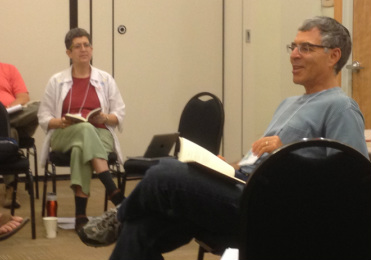 Daniel Matt at the retreat I attended this week
Daniel Matt at the retreat I attended this week The featured teacher at the retreat was Dr. Daniel Matt, one of today's foremost scholars of Jewish mysticism. He is currently working on the first-ever complete English translation of the Zohar, the most important text of Jewish mysticism. The first seven volumes of the twelve-volume project have been published.
I'd like to share with you one text we studied this week that has special meaning for me. It is a fable from the Zohar about a man who lived in the mountains who came, for the first time in his life, to see the way people lived in the city. The man who lived in the mountains ate a diet of raw wheat kernels, so he was puzzled when the city people gave him good bread to eat.
"What is this?" he asked.
The city people answered, "It's bread. It's for eating."
He ate it and it was very good. He asked, "What is it made of?"
They told him, "It's made from wheat."
Later, they brought the man cakes of flour mixed with oil. He tasted them and asked again, "What are these made of?"
Again, the people told him, "They are made from wheat."
Afterwards, the city people gave the man pastry fit for a king made with oil and honey. The man asked, "What is this made of?"
They answered, "It's made from wheat."
The man then said, "Enough. I am the master of all of these things, for I eat the essence of all of them — wheat!"
This is what he thought, but actually he knew nothing of the world's delights. It was lost on him. Thus it is for one who grasps an idea, but knows nothing of the delights that flow from it.
(Sefer HaZohar 2:176a-b)
Surely, the Zohar included this story as a polemic against fundamentalism. The Zohar detests literal readings of the Torah and it derides Judaism that is only about fulfilling mitzvot as if they were boxes to check off on a to-do list. The Zohar demands that we probe the deepest recesses of Torah to find the secret path to encounter God intimately. Nothing else will suffice.
It seems to me that the story also can be read as a dialogue between two different views of human nature and the universe. One view says that our most essential state — the base-line of our soul — is one of neutrality. It is the flavor of raw wheat kernels. Life, as it were, is a blank canvass upon which we may paint positive or negative responses to whatever we might experience. The essence of our existence, though, according to this view, is the equivalent of white noise. The universe is uninterested in us. It is up to us to provide the meaning, the purpose, the color, and the flavor of reality.
The other view says the opposite. It says that the universe is filled with mystery and our most essential state is to be in wonder and ecstasy of all that surrounds us. There are delights beyond the veil of ordinary experience that surpass our imaginings — and those delights delight in our finding them. The universe is intensely interested in us. It is waiting for us to fulfill the meaning and purpose it has waiting for us. Our spiritual baseline, so to speak, is joy — rapturous joy — that is only waiting for us to taste it. Life is like a box of baklavah.
Which view of the universe do you hold in your life? What flavors linger in your mouth as you go through the day-to-day activities of your existence?
I want to suggest that our tradition comes down squarely on the latter view. We are here to be joyful. Happiness is our most basic state. Look in the eyes of a newborn and you will see it there. Happiness may be hidden from us at times — sometimes long stretches of time — but it is always there, waiting for us.
If you would like to read more texts like the Zohar's story of the "Mountain Man" for yourself, I encourage you to get a copy of Matt's book, The Essential Kabbalah. I have used it on several occasions, most recently last winter, in teaching Jewish mysticism to adults. A recent Hebrew edition of the book, called Lev HaKabbalah, is also available. It gives the original Hebrew and Aramaic texts of the passages in the earlier book. Taste its delectable fruits with joy.
Other Posts on This Topic:
Revitalizing Jewish Life
Emor: Counting to Revelation

 RSS Feed
RSS Feed
